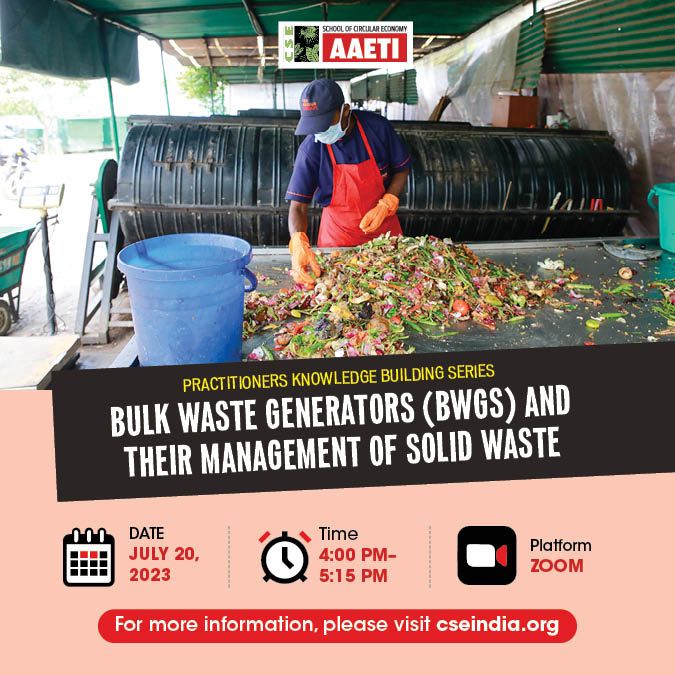Practitioners’ knowledge building Series on Bulk Waste Generators (BWGS) and their Management of Solid Waste : CSE

![]()
Date: 20th July 23 / Time: 4:00 PM – 5:15 PM / Platform: Zoom
The Centre for Science and Environment (CSE) is a public interest research and advocacy organisation based in New Delhi. CSE researches into, lobbies for and communicates the urgency of development that is both sustainable and equitable. The scenario today demands using knowledge to bring about change. In other words, working India’s democracy. This is what we aim to do.The challenge, we see, is two-pronged. On the one hand, millions live within a biomass based subsistence economy, at the margins of survival. The environment is their only natural asset. But a degraded environment means stress on land, water and forest resources for survival. It means increasing destitution and poverty. Here, opportunity to bring about change is enormous.But it will need a commitment to reform – structural reform- in the way we do business with local communities. On the other hand, rapid industrialization is throwing up new problems: growing toxification and a costly disease burden. The answers will be in reinventing the growth model of the Western world for ourselves, so that we can leapfrog technology choices and find new ways of building wealth that will not cost us the earth. Our aim is to raise these concerns, participate in seeking answers and in pushing for answers, transforming these into policy and so practice. We do this through our research and by communicating our understanding through our publications. We call this knowledge-based activism. We hope we will make a difference.
How can Bulk Waste Generators (BWGs) manage their waste and help cities divert the waste from reaching landfills? Join this free masterclass to know how. Register today
Bulk Waste Generators (BWGs) are entities that generate waste in large quantities. It is estimated that BWGs contribute about 30-40 per cent of the total waste generated in a city. A lion’s share of this waste — 50-70 per cent — is biodegradable in nature.
The Solid Waste Management Rules (SWM Rules), 2016 and the Union Ministry of Housing and Urban Affairs have laid down specific criteria for classifying a waste generator as a BWG. According to these criteria, waste generators can be categorised as BWGs if their average waste generation rate is over 100 kg per day, and if they qualify as a resident welfare and market association, gated community, government office, institution, etc built over an area of more than 5,000 sq m. The SWM Rules, 2016 mandates these BWGs to manage organic waste within their premises, either through composting or bio-methanation.
Centre for Science and Environment (CSE), which has been working extensively on policy and implementation of segregated organic waste treatment by BWGs, invites you to its latest webinar in the Practitioner’s Knowledge Building Series – on how BWGs can manage their waste and help their cities divert the waste from reaching landfills.
NOTE: This master class is free. Waste management practitioners, officials from Central and state urban departments and municipalities, urban and town planners, NGO representatives, CBOs, and anyone interested in the subject are welcome. All those who register will receive an automatic confirmation. However, we request you to register yourself at the earliest and reach out to us in case of any queries. No certificates will be provided.
Click here to know more and apply
FOR FURTHER DETAILS, PLEASE CONTACT:
MOU SENGUPTA
Email: mou.sengupta@cseindia.org
Mob No: +91 9836448262
KAIFEE JAWED
Email: kaifee.jawed@cseindia.org
Mob No: +91 9755411810

